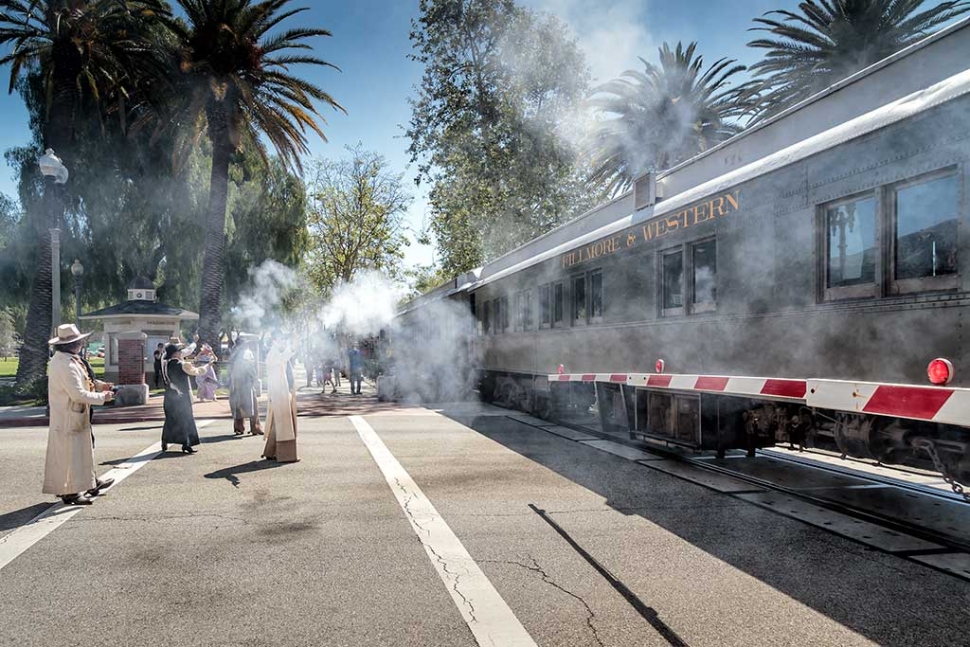|
Photography Know-How
 Photo of the Week "Steam engine train rounding curve" by Bob Crum. Photo data: Canon 7DMKII camera, ISO 200, Tamron 16-300mm lens @18mm, aperture f/7.1, 1/320 second shutter speed. By Bob Crum — Wednesday, May 16th, 2018
Point-and-Shoots
 Bob Crum  All photos by Bob Crum.        Though I often contemplate unmercifully admonishing Buy A Camera! my saintly conscience dictates entice gently. Thus you are spared undue wrath which I suspect would ultimately serve no useful purpose anyway. A constant email question: Why do I need a camera while my smartphone takes fine photos? Smartphones are wonderful for “snaptography... not photography! Let's explore & discover”. Beware: The intent is to convert you! Yes, a few ubiquitous smartphones sport some useful features; optical image stabilization, better autofocus systems and shutter speed adjustments. The cliché the best camera is the one you have with you obviously applies to smartphones... presuming that you don't own a “real” camera. However, a smartphone is a generalist device. As a camera, a cursory glance of smartphone camera specs quickly reveal several deficiencies. That hurts, I know. Phonetographers want their smartphone to also be a 'great' camera. It ain't! If you want superior image quality, and photography experience, a dedicated camera is paramount. The compactness of smartphones prevents optical zooms which is superior. Hence, they employ inferior digital zooming. A digital zoomed image is merely cropped and expanded, decreasing resolution and image quality to varying degrees. Smartphones also suffer from incredibly small sensors. A tiny sensor decreases dynamic range which affects how many colors the sensor can accurately produce. Larger sensors of dedicated cameras mean higher dynamic range and decreased noise levels in dim light resulting in much better image quality. Depth of field is important in the photographic creative process. Most smartphones utilize wide-angle lenses. Great for bokeh... not depth of field. So what? Depth of field matters greatly if you intend to creatively control image composition. Dedicated camera battery life is much greater. A smartphone's ultra compact size prevents using robust batteries, just enough power to get through a day of normal use. Shoot some smartphone photos/video and the battery energy is quickly depleted. Note that camera batteries are swappable in the field if needed. Nice. For ultimate convenience, can't beat smartphones. But for quality photos, a dedicated camera kicks smartphones to the curb. Image quality, accompanied with enhanced creativity, dedicated digital cameras will continue to be a great purchase far into the future. By the way, anyone see an 8 X 10 print from a cropped smartphone photo? It's awful! The June issue of Consumer Reports includes an interesting camera article. CR contends that most consumers trading up from a phone camera will be pleased with the a class of cameras called 'enhanced' point-and-shoots. Also referred to as 'bridge' cameras, they utilize fixed lenses which are quite sharp as indicated in camera reviews. Enhanced point-and-shoot cameras also provide for manual control. They also capture photos in the RAW file format, important for non-destructive photo editing. A small sample of CR's rated point-and-shoots: Canon PowerShot G7 X Mark II, Canon PowerShot G3 X, Sony Cyber-shot RX10, Sony Cyber-shot RX100IV, Panasonic Lumix DMC-LX100, Panasonic LX10. For the adventurous, there isn’t a better rugged waterproof compact around than the Olympus TOUGH TG-5. Here's a link to a valuable camera review resource to help you with due diligence... https://www.the-digital-picture.com/Reviews/ Next: dSLR cameras. The photo of the week is another of the magnificent steam engine shot during the recent Railfest. The composition is one of many creative options. Point being, most situations will offer multiple options for framing the composition. A camera and an artistic eye create memorable photographs. Exercising creativity makes photography profoundly gratifying. Not only is photography an exceptionally rewarding experience, it is also an unconditional means of expression. Cameras provide the means!!! Convinced? Send comments, suggestions, questions to bob@fillmoregazette.com |
